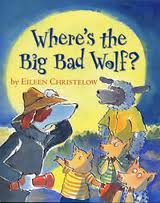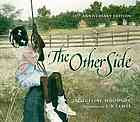Pullman, Philip. (2008). The Golden Compass. Paw Prints.
342 Pages
Ages 12-16
Plot:
Lyra Belaqua is a wild and defiant young girl growing up in the care of the scholars at Jordan College at Oxford, when her uncle returns for one of his rare visits and her life suddenly changes. She's witness to a murder attempts on her uncle and then becomes entangled in a world of political and philosophical drama. Dust has been discovered - an elementary particle which does not seem to affect young children like Lyra. It is believed by some that this dust is the remnant of original sin but opposing viewpoints quickly develop. Children begin to be kidnapped for experimentation, Lyra's uncle is imprisoned by armored bears in the north and it's up to Lyra and a band of Gypsies to rescue them all. Without knowing it, Lyra is destined to alter the course of the future for all.
My Impressions:
As a fantasy book, this book depicts a thoroughly developed world of wonder and masterfully tells an intriguing tale. As a challenged book, I can see why some might see it as challenging to the foundations of Catholicism. I however do not think this is the main motivation behind the book. The book seems merely to want the reader to reexamine that which we think we know based on internal questioning rather than taking everything that is said for granted. Also, the book is set in a world much like our own at the turn of the century. It is set at a time when the church was losing much of its control over general political and social affairs, and not in today's world. Despite any challenge or debate that might erupt from its political agenda, the book is a fantastically imagined story of courage, integrity and choice. I really enjoyed the read and think I'm going to have to read the two sequels next.
Reviews:
From School Library Journal
"A self-styled author of "pop culture books on unauthorized subjects" tackles Pullman's trilogy. Beahm's compendium, aimed at introducing the "casual reader" to the books and forthcoming film version of The Golden Compass (Knopf, 1996), includes a chronology of Pullman's life and works; a lengthy excerpt from his autobiographical sketch in Something about the Author (Gale); a description of his major literary influences, Milton and Blake; and a useful list of key characters, places, and things in each of the three books. To these Beahm adds excerpts from reviews, information on relevant Oxford sites, and the transcription of a discussion with Pullman, the film's producer, and its visual-effects supervisor at the March 2007 Oxford Literary Festival. Brief comments from the film's cast and crew, bibliographies describing various editions of each title in the trilogy, as well as selected books about Pullman and his works round out the information presented. Sometimes repetitive and occasionally inaccurate, this guidebook reads more like a scrapbook compiled by an enthusiastic fan than a serious reference volume. The patchwork quality extends to the book design. Black-and-white photographs of Oxford sites face each section, while black-and-white images of book jackets are interspersed throughout the text, along with line drawings of objects important in the trilogy. An inset featuring glossy color photographs of Pullman's Oxford is also included. For larger collections."
Chang, M. A. (2007). Discovering The Golden Compass: A Guide to Philip Pullman's Dark Materials. School Library Journal, 53(10), 170.
Excerpt from Library Journal
"It takes a remarkable book to cross over from the juvenile to the adult division of a major publisher. Philip Pullman's The Golden Compass, an ambitious fantasy inspired by John Milton's Paradise Lost, is such a book."
Boehning, J. C. (1996). Philip Pullman's paradise. Library Journal, 121(3), 175.
Library Suggestions:
This book represents a more recently and quite publicly challenged book and should definitely be represented by being including in such displays during banned book week. Such a display could be accompanied by forms that could be filled out based on reader's opinions either on the subject of banned books in general or their reactions to such books as The Golden Compass.
This book represents a more recently and quite publicly challenged book and should definitely be represented by being including in such displays during banned book week. Such a display could be accompanied by forms that could be filled out based on reader's opinions either on the subject of banned books in general or their reactions to such books as The Golden Compass.














